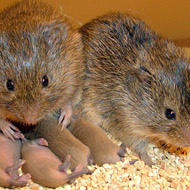
Findings could inform work on autism
A study of prairie voles by US researchers has revealed what might happen in the brain when a relationship forms.
Researchers from Emory University in Atlanta found a link between areas of the adult female prairie vole’s brain reward system that promotes bonding.
They hope that results from this study, published in the journal Nature, could aid work to approve social abilities in humans with impaired social function, such as autism.
Elizabeth Amadei, who co-led the work, commented: "As humans, we know the feelings we get when we view images of our romantic partners, but, until now, we haven't known how the brain's reward system works to lead to those feelings and to the voles' pair bonding."
Prairie voles are socially monogamous and mate for life. Building on previous neurological work with the creatures, the team set out to address exactly what happens in the brain when they form a bond.
The researchers found that when a female vole meets a potential partner, its prefrontal cortex helps control the neural activity within the nucleus accumbent - the central hub of the brain’s reward system.
‘This suggests a functional connection from the cortex shapes neurons activity in the nucleus accumbens,’ they write.
The researchers also noted a difference in the strength of this connection. Voles with stronger connectivity in the brain 'huddled' up to their partner faster than those with weaker connections.
Furthermore, the pair’s first mating strengthened this functional connection and the amount of strengthening correlated with how quickly the animals then huddled.
Co-author Larry Young commented: “It is remarkable there are neural signatures of a predisposition to begin huddling with the partner.
“Similar variation in corticostriatal communication could underlie individual differences in social competencies in psychiatric disorders in humans, and enhancing that communication could improve social function in disorders such as autism.”
Image (C) Emory University



 The latest
The latest